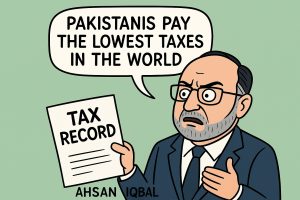THE DETRIMENTAL IMPACT OF RECENT TAX POLICIES ON PAKISTAN’S INDUSTRIAL SECTOR AND EXPORT COMPETITIVENESS
Author June 29, 2024
The
recent budget approved by the Parliament appears to be the last nail in the
coffin for the already struggling industries of Pakistan. The Government’s aim
seems to be to squeeze taxes from those who are already compliant, without
making any substantial effort to collect taxes from untaxed or undocumented
sectors.
In
times when Pakistan is facing a significant balance of payment crisis and is
burdened with substantial foreign and domestic loans, the Government’s focus
should have been on incentivizing industries to invest in sectors that either
export goods or provide local alternatives to imported goods. However, the
Government has adopted a different approach, further burdening exporters and
other manufacturers.
The
following are some major issues and bottlenecks created by the Government,
which will hurt exporters and other manufacturers and will prove extremely
detrimental to any future investment in Pakistan’s manufacturing sector:
- Currently, exports are
subject to a Final Tax of 1% of export proceeds. As per the Finance Act,
2024-25, exporters will now be subject to an income tax rate of 29% and a
super tax of up to 10%, totaling 39%.
- At present, the Federal
Workers Welfare Fund (WWF) is not applicable to exports. However, since
exports will now be subject to the Normal Tax Regime, an additional 2% WWF
will also be applicable.
- Despite a 1% minimum tax for
exporters, proceeds from exports are now subject to tax collection at 2%
(1% minimum and 1% advance). This is incomprehensible, as commercial
importers are subject to minimum taxes of 1%, 3.5%, and 6% (based on the
category of items) and are not subject to any further income tax
withholding.
- Other manufacturers are
subject to a 1.25% minimum turnover tax but are also subject to income tax
collection at rates of 1%, 2%, and 5.5% (based on the category of items)
at the time of import. Additionally, when they use electricity to
manufacture or process these items, they are subject to a 5% tax
collection on electricity bills. When they supply manufactured goods to
the market, they are again subject to a 5% income tax withholding by the
buyer. With all these tax deductions, it becomes nearly impossible for
anyone to consider investing in the manufacturing sector in Pakistan.
- To avail income tax
exemption from tax withholding at the time of supply of goods,
manufacturers are required to pay upfront advance tax to the tax
department. However, instead of complete exemption, the law has now been
amended to issue only a tax reduction certificate. Therefore, even after
paying income tax in advance, manufacturers will have to request each
buyer to provide tax deduction certificates, further increasing
operational costs and complications. On the other hand, after paying
income tax withholding at the import stage, commercial importers are
exempt from any further income tax withholding on supply without needing
to obtain an exemption certificate from the Commissioner of Inland
Revenue.
In the 1960s, a massive tax cut was John F. Kennedy’s premier election catchline. When a news reporter asked him how he would handle the situation if he fell short of revenue targets, he replied that he would further reduce the tax rate. His logic was clear: “Leave enough money with the entrepreneur to reinvest in the business, and he will come back with higher taxes.” This strategy worked and paid off. There needs to be a balance between the citizen’s right to earn lawfully and the state’s right to tax. The imposition of tax is, by its nature, an interference with the fundamental right of a citizen to earn lawfully. Nonetheless, this interference is necessary, and since it remains an interference, the state’s right to impose taxes must be exercised with restraint and utmost care. However, in Pakistan, taxes are levied without proper planning or long-term vision. The industrialists and salaried class of Pakistan had many hopes from the Finance Minister, but based on the irrational amendments made through the Finance Act, it appears that there is no hope for the revival of industrialization in Pakistan. The Government has been urging foreigners to invest in Pakistan, but with these discouraging tax amendments, even foreign investors will consider relocating existing investments to other countries. If relocation is difficult, they will certainly consider making new investments outside Pakistan. This is evident from a recent notice issued by a listed company on the PSX, informing about the plans of its Board of Directors to establish a manufacturing company in Dubai to undertake manufacturing and other activities related to biscuits and other confectionery items.







